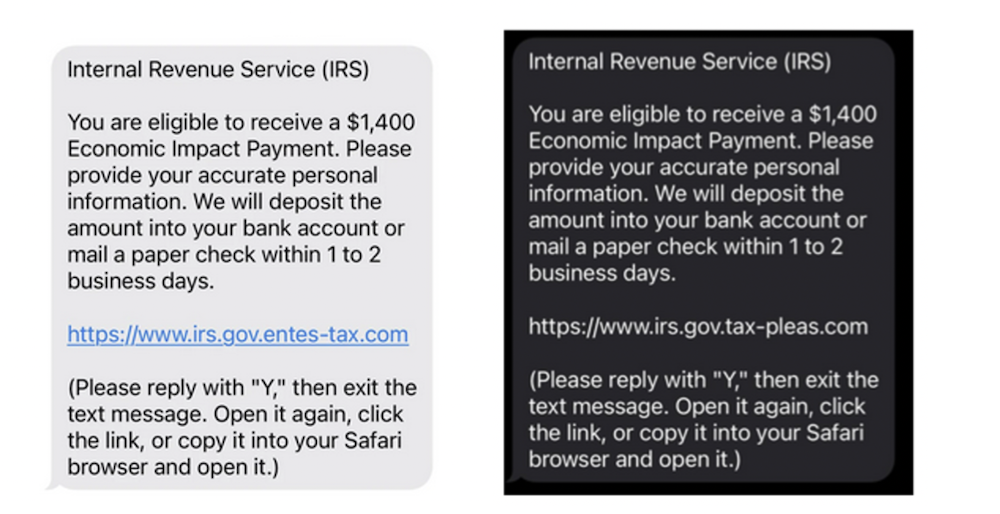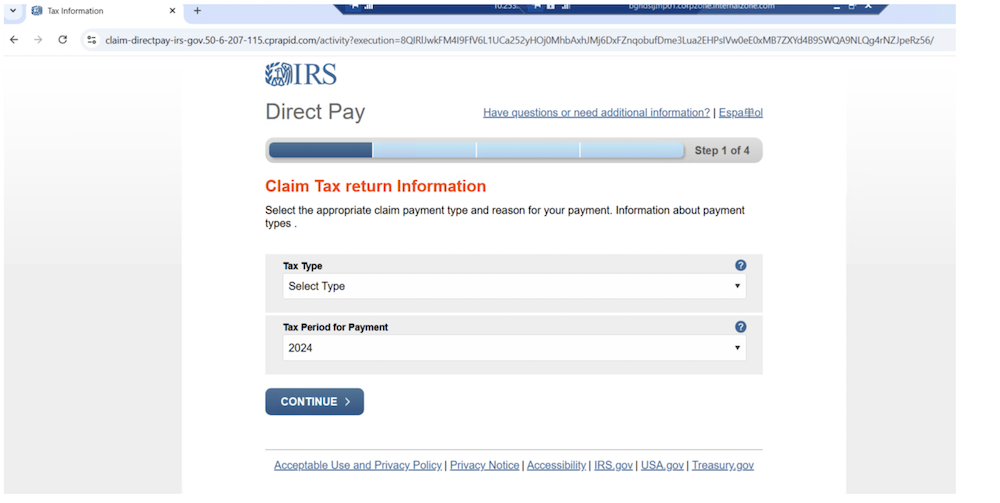As Tax Day looms and last-minute taxpayers really feel the strain, a surge of IRS scams is on the rise.
Analysis by our McAfee Labs group initiatives a recent wave of refined tax scams because the stress of peak submitting season units in, with bogus textual content messages main the way in which.
Almost half of taxpayers full their taxes between mid-March and April 15, which provides scammers ample alternative to money in as folks rush their filings with the IRS.
Based mostly on our information from 2024, right here’s what we are able to count on within the coming days:
- We’ll see a surge in tax scams – The variety of malicious tax rip-off URLs almost quadrupled from February 1 (2.9% of exercise) to February 28 (10.5%) final 12 months, with the largest spike on the finish of the month.
- Cell assaults will dominate – 76% of all tax rip-off exercise in 2024 focused cell customers through textual content, usually utilizing URL shorteners to disguise fraudulent hyperlinks.
- Extremely coordinated rip-off campaigns will roll out – A single marketing campaign accounted for 17.3% of all tax-related blocked URLs in 2024, utilizing pretend IRS-style hyperlinks (like, ”irs.gov.tax-helping(.)com”).
Along with posing because the IRS, scammers will pose as tax prep and tax software program corporations as properly. Simply as in years previous, taxpayers can additional count on scams constructed round fast refunds and straightforward submitting options which can be truly fronts for scams. But no matter guise scammers placed on, their purpose stays the identical. They wish to dupe taxpayers out of their private and monetary data.
Widespread Tax Scams To Look Out For
Tax season is excessive season for scammers as a result of a lot private data will get gathered and shared on-line. With that, many taxpayers have their guard down. They count on to see messages, adverts, and so forth about their taxes, which might make them extra prepared to share a few of their most private data. That’s the place scammers step in. They wish to:
- Steal account data – Scammers attempt to highjack account or monetary data related to bank cards and banks to steal funds and make purchases with a sufferer’s card.
- File false returns – Scammers additionally attempt to file false returns in a sufferer’s identify and declare their refunds, which leaves the sufferer with out their cash and a fraud declare on their arms.
- Commit id theft – Scammers use the information they steal to open new credit score traces and accounts in a sufferer’s identify.
- Re-sell stolen data – Lastly, scammers may also flip a revenue on their victims by promoting stolen data on darkish net marketplaces. As a substitute of utilizing it to commit id theft
themselves, they promote it to others who will.
this record, you may see what makes tax scams so damaging. Lots of them goal our most valuable of private data—our Social Safety Numbers (SSNs).
A stolen SSN opens the door to a few of the most painful types of id theft, like imposter fraud, insurance coverage fraud, employment fraud, and extra. These follow-on assaults may cause nice hurt to a sufferer’s funds and repute in methods that may take months, and even years, to restore.
How Tax Scams Work
In impact, tax scams ship a one-two punch.
It begins by baiting the sufferer with a phony message from a scammer posing because the IRS, a tax prep enterprise, or a tax software program firm. That may come by e mail, a direct message on social media, and even in paid search outcomes.
Largely, scammers bait victims with texts. Cell assaults certainly dominate the popular contact methodology, simply as we referred to as out. Right here, scammers usually use hyperlink shorteners to disguise fraudulent hyperlinks. (You’ve seemingly seen loads of hyperlink shorteners like bit.ly and goo.gl. They make it simpler to share lengthy addresses, however the flipside is that there’s no fast approach to inform the place they actually take you.)
In some circumstances, scammers try and trick taxpayers by weaving “irs.gov” into the online tackle. Beneath you may see one instance, the place the area isn’t “irs.gov.” It’s truly “entes-tax(dot)com,” which results in a rip-off website.

Rip-off texts that weave “irs.gov” right into a malicious hyperlink
As for the textual content itself, scammers ship urgent-sounding messages about tax returns like, “Your refund is on maintain, contact the IRS instantly.” Different scammers use concern, leveling threats like jail time for non-payment. In different circumstances, scammers threaten to revoke issues like driver’s licenses and enterprise licenses, and even immigration standing. In accordance with the IRS, these are frequent indicators of a rip-off. The IRS by no means makes use of threats or ways like these to resolve tax points.
The second punch comes by clicking the hyperlink in these messages, which results in IRS copycat rip-off websites. They usually can look convincing. Probably the most refined of them mirror the feel and appear of the official IRS web site and use URLs that look “shut sufficient” to an IRS URL, which might trick anybody who doesn’t study them intently.

Instance of a pretend IRS declare web site
And that’s the place the harm will get performed. Underneath the false pretense of receiving a refund or making a cost, the scammers accumulate that valuable private data we talked about, which might trigger short- and long-term fallout for victims.
The identical method works for scammers who pose as tax prep providers and tax software program corporations. The texts and web sites look totally different, but they’re nonetheless a part of a scheme for accumulating the identical forms of private and monetary data.
How To Keep away from Tax Scams
Intelligent as these scams are, you may keep away from them. Step one is consciousness. By studying this text and sharing it with others, you unfold the phrase about these scams and simply how rampant they’re.
From there, you may take a number of extra steps that may maintain you far safer throughout tax time:
- Be suspicious of emails and cellphone calls claiming to be from the IRS. The IRS usually contacts folks by bodily mail, not by e mail or textual content. (See their record of the way the IRS will contact you for extra particulars.)
- By no means give out private data on the cellphone. The IRS won’t ever name to ask for private data over the cellphone, and no authorities company will ever ask you for cash over the cellphone. Funds demanded in cash orders, reward playing cards, and on-line cost platforms apart from IRS.gov are an absolute purple flag.
- Go straight to the supply. Confirm all web sites and emails, even when it appears to be like like they arrive from a trusted tax guide or companion. Go straight to the supply as a substitute of clicking on hyperlinks in emails or texts.
- Take away your private data from sketchy information dealer websites. Scams over e mail, cellphone, and textual content all require one thing—your contact data. In lots of circumstances, scammers get it from information dealer websites. Knowledge brokers purchase, accumulate, and promote detailed private data, which they compile from a number of private and non-private sources. Our Private Knowledge Cleanup scans a few of the riskiest information dealer websites and reveals you which of them are promoting your private data.
- Lastly, file your taxes as rapidly as attainable. One approach to maintain a scammer from claiming your refund is to assert it first. In some circumstances, taxpayers solely discover out they’ve been scammed as soon as they file a return—solely to find that it’s already been filed.

Introducing McAfee+
Id theft safety and privateness in your digital life.

